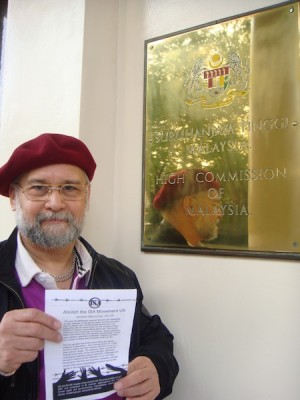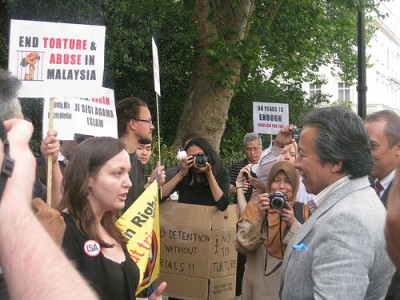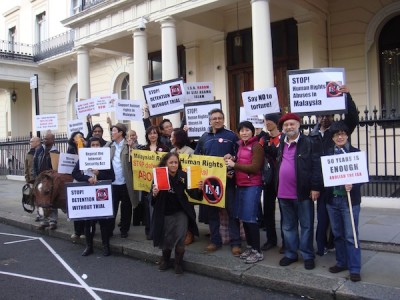Following the anti-ISA demonstrations in August, another anti-ISA protest took place in London on Saturday, 30 October. Recounting the August event, a LoyarBurokker in London reminds us why all of us should continue denouncing the ISA.
TORTURE is not a word that is used lightly in the international human rights community. Yet when the UN Working Group on Arbitrary Detention concluded their visit to Malaysia in June this year, they announced, having interviewed detainees in prisons and detention centres across the country, that “virtually all … especially those detained under the preventive laws, indicated that they had been subjected to torture or ill-treatment in order to obtain confessions or evidence in police detention.”
Now read that again, and consider what that means in terms of the suffering, pain and humiliation that is regularly being inflicted on shackled and defenceless people every day in Malaysia.
As Malaysians, the most appropriate emotional response to this indictment is shame. Shame, because we know that the indictment is doubtlessly well-deserved. Shame, because as citizens and as voters we have been unable to prevent what has been going on in our name. And shame, because as a people we belong to a country that today deserves to be treated as a pariah in the international community; one of the Zimbabwes and Burmas of this world.

Demonstrating in London
On 8 August 2010, some 20 or more Malaysians and friends gathered outside the Malaysian High Commission in London, where the Foreign Minister, Anifah Aman was due to speak. This demonstration, organised at short notice, came a week after another regular monthly anti-ISA protest in Trafalgar Square, and hot on the heels of a demonstration against the visit of Taib Mahmud to Oxford. The demonstration was a small act of solidarity, seeking to express the impatience and disgust that Malaysians back home had been prevented from showing on 1 August, the week before.
There were no riot police, no mass arrests and no “untoward incidents”. All we had were banners, placards and candles – and a megaphone with which we shouted slogans across the road towards the High Commission. Eventually, we got word that Anifah himself would come and speak to us when he arrived at the High Commission. When he did, he heard our views, and he expressed his own view and that of the Government to boisterous dissent. I will not rehearse what was said, which has been reported elsewhere, but I will make several observations that may be relevant to people back home.

Observations from overseas
The first is that the government is on the back foot as far as the ISA is concerned. It is impossible to defend, and Anifah could not defend the way the ISA has been used in the past. The record of this Government and the allegations of torture and ill-treatment speak for themselves. Having now said that they will amend the ISA, the Government must now either publish their amendments – which will without doubt spark a fierce and spirited debate, and more protest because there is little chance that the amendments will go far enough, or they must drag out the drafting process for as long as they can – in which case it will be clear to Malaysians and to the world that they are wholly insincere.
The review of the ISA has now been going on for over two years since Zaid Ibrahim announced it in May 2008. The tabling of the amendments has been repeatedly delayed, the latest date given being October 2010, next month. A key date is now March 2011, when the UN Working Group presents its final report on its visit to Malaysia to the Human Rights Council. By that time, the Government has to be able to say with surety that they are putting in place defined amendments, or else face further embarrassment in the international community.
From our encounter with Anifah, it appears that the Government does not like being compared to Zimbabwe, and yet they are not ready to be compared with more advanced countries that manage to do without laws providing for detention without trial. The anti-ISA movement must be prepared with a strategy to deal with amendments that the Government hopes will take the wind out of the sails of popular discontent with the ISA.
Finally, it should be clear from the above that the present and the months ahead are not a time to sit back, but rather are a pivotal point in the fight against the ISA. Every pressure must be brought to bear to influence the amendments that are eventually tabled and how those amendments are received by the Malaysian public and by the international community. With that in mind, we may on reflection note how feeble were the anti-ISA protests, and how inadequate the contribution of the official Opposition parties on so important an event as the 50th anniversary of the ISA’s enactment.
The Government must surely be laughing: in August 2009, over 20,000 protesters filled the streets of Kuala Lumpur, and Anwar Ibrahim, Lim Kit Siang and Abdul Hadi Awang actively led the protests, which gained wide international attention. In August 2010, the 50th anniversary, there were protests by no more than a few hundred protesters, with no Opposition presence, which were very easily suppressed by the police. Can we afford to let the Government take this as a sign of diminished resolve?

Conclusion
I hope that I am not misunderstood when I state the views I have expressed above. I pay tribute to the courageous hundreds who did turn up in George Town, Ipoh, and Petaling Jaya to protest against the ISA in the face of heavy police intimidation. By comparison to them, we in London did nothing worth mentioning, being privileged to be able to protest freely without hindrance, and even to have the cooperation and assistance of the Metropolitan Police. We were even able to deliver a petition to, and to speak frankly for over half an hour with a minister of the Cabinet.
It is a striking contrast: for why were our counterparts in Malaysia unceremoniously dispersed or arrested simply for organising a peaceful candlelight vigil?
Perhaps this is entirely because it is in Malaysia that the Government most fears dissent and the open demonstration of defiance by the ordinary citizen.
Yet we should all have known from the start that what we were struggling against was a legal regime that was purposely designed to instill fear and complaisance in the heart of ordinary Malaysian citizens.
We have to expect, and we must be prepared, therefore, for more of the same from those for whom the ISA is a key instrument of political power.
Let us therefore continue, and let this be a call for Malaysians everywhere to step up the struggle.
Andrew is a Penangite with plans for world domination. Having escaped from a (metaphorical) dungeon where he was kept for five years by his enemies in the City of London, he is now finishing an LLM in human rights and constitutional law at the School of Oriental and African Studies. He intends to crush all who stand in his way (but in a nice, human-rights-compliant manner).
See Also:
Anifah Aman makes London the new and improved Bolehland by Leong See-See

ISA IS THE ONLY WEAPON THE BN CAN HOLD ON TO REMAIN IN POWER;
THEY HAVE NOTHING ELSE; SO ONE CANNOT EXPECT TO RELEASE ISA.
Jeyapalan-
There's nothing to stop Parliament from repealing the ISA if it wants to. Those who are lawfully detained before the Act is repealed would have no claim for damages.
Before the Constitution was amended in 1960, acts such as the ISA would lapse unless renewed by Parliament each year. So it is not that Parliament needs to justify why it should repeal the Act, but rather why it should _not_ repeal it.
Andrew!
Sorry an after thought – a lot of "persons" all along the gravy train, will also be "truncated"{ i hesitate to use the other phrase……….} as this group would no longer have the sense of power and/or , loose a veritable gold mine.
Cheers!
Andrew!
An observation – if the ISA is repealed, there has to be a very very good reason/ground, for such a repealing.
Inadvertantly, it will simply mean that what was a crime has /would become no longer a crime!!!
How the dickens can this be justified?
What about all the victims, all these years, of ISA detentions & arrests?
Originally, and this is in the Hansards, the ISA was only for the period of The Emergency.
But somehow the ISA became institutionalised!!!
It is like saying that MURDER is now longer MURDER!
Why & What about those sent to the gallows & in prison?
I believe that The MOHA & The AGC are caught in the veritable CATCH 22!
And i further believe that if the ISA is indeed repealed{as it should}, the GOM will be faced with a whole lot of damages suits amounting to $$$$$$$$$$$ aside from "padam muka"
Godspeed from Petaling Jaya